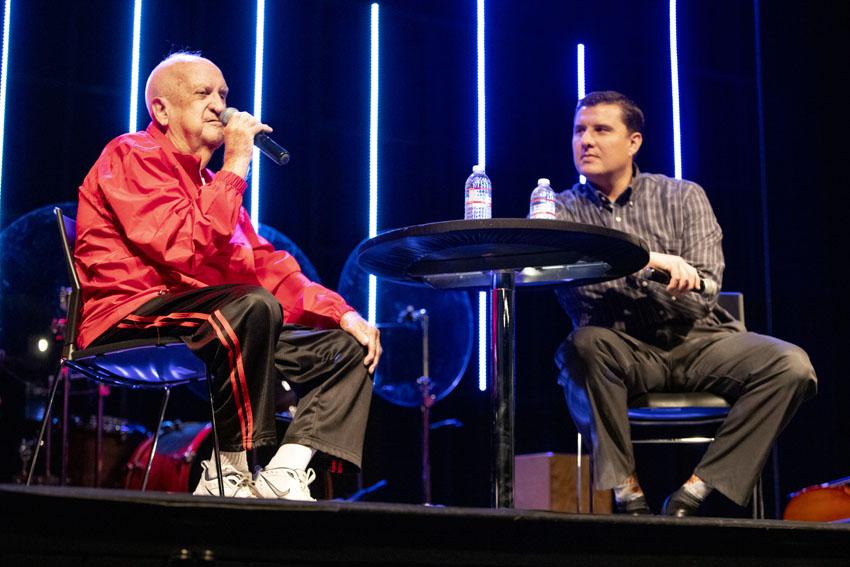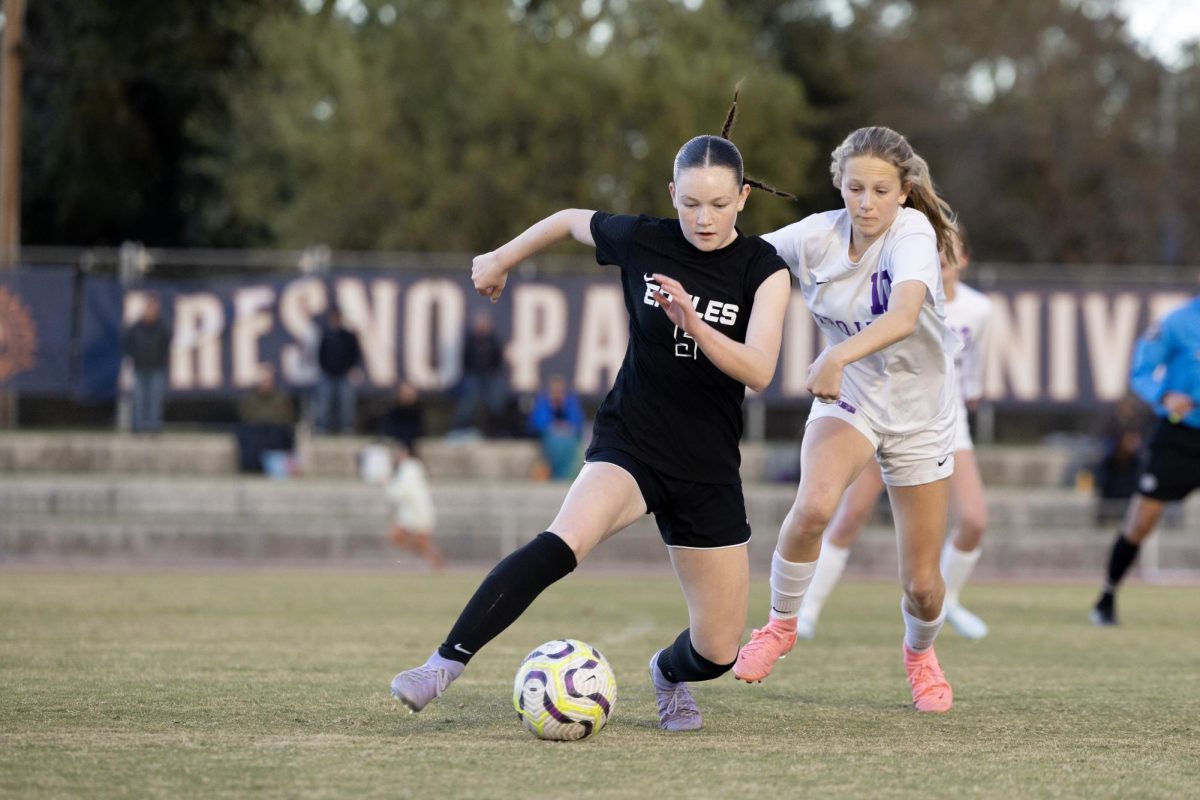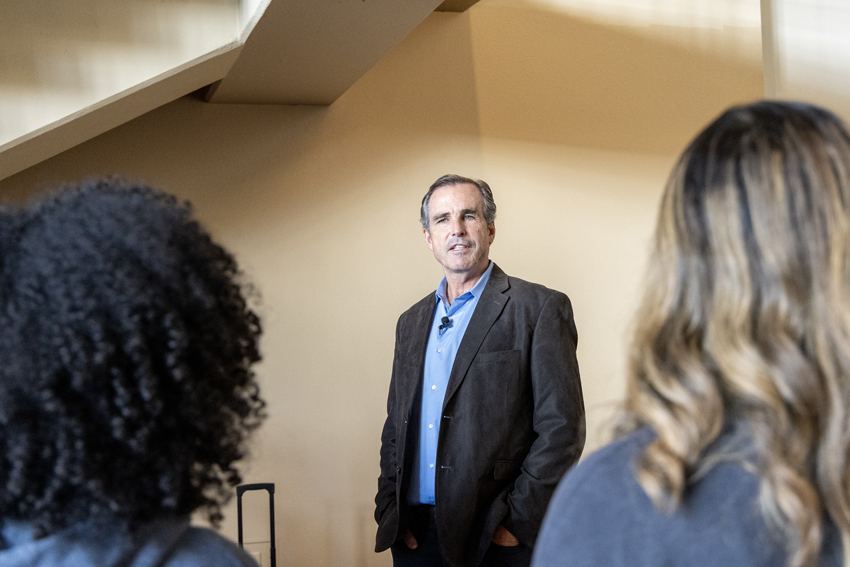Bob Cole shares experience on USS Hornet, eye injury

WWII veteran Bob Cole (age 97) served in the US Navy on the infamous USS Hornet in 1942, one year after the bombing at Pearl Harbor. Cole survived the battle of the Santa Cruz Islands where the Hornet was attacked by Japanese bombers and he almost lost his eye.
As part of the campus Veterans Day chapel, local radio personality and campus father Paul Loeffler interviewed Cole on stage, Nov. 14.
Cole grew up in Oto, Iowa, a small town boasting a population of around 300 people. After joining the Navy to pay for college, Cole moved to a bigger city near the Great Lakes for training. One of Cole’s most vivid memories of that time was encountering the diversity of the big city.
“Back in my hometown, the tallest building was an agricultural elevator that the farmers would use to store grain,” Cole said. “Also, of the 300 people in my city, there was only one Latino family and one African-American family.”
Training in the Navy, Cole learned how to march and keep his uniform clean. Cole describes these skills in detail.
“You needed to learn how to march,” Cole said. “We did a lot of marching. Back then we had our sailor clothes, but we didn’t have an iron. To keep them from getting wrinkled, we would roll them up as tight as we could. If you could bounce them on your bunk, you did a good job.”
In the following video created by senior Braden Bell, Paul Loeffler, right, interviews WWII veteran Bob Cole during chapel, Nov. 14.
Veterans Day Chapel from The Feather Online on Vimeo.
Cole recalls how the food on the ship compared with what he normally ate in his hometown. He enjoyed the Navy food more than his home food, trying meals he had never eaten before.
“The food was different in the navy as well,” Cole said. “Back home I had fried potatoes, fried eggs and refried beans. On the ship, there was food that I had never seen before. Most of the food I had on the ship was better than the food I had back home.”
In the following tweet, radio personality Paul Loeffler shares his experience interviewing WWII veteran Bob Cole.
Had a blast today w/our friend Bob. You’d never know he was 97, & was wounded in the sinking of the Hornet (CV-8) 77 years ago. Great to have Alan there to surprise him & thank him for a life-changing moment in the classroom. https://t.co/UQuTAZioE4
— Paul Loeffler (@P356Loeffler) November 15, 2019
Cole worked on the USS Hornet, an aircraft carrier in the Pacific Theatre during WWII. The Hornet experienced the battle of Midway and was sunk during the battle for the Santa Cruz Islands. The carrier also launched the famed bombing raid on Tokyo concocted by James Doolittle.
“I put veins and fuses on bombs,” Cole said. “There was 75 of us in the mess hall right under the flight hangar. We would prepare the bombs and send them up via elevator to be loaded onto the planes.”
During the Battle of Santa Cruz Islands, Cole’s ship was hit by several bombs. In one of the blasts, shrapnel sliced his face and his eye fell out of socket, dangling by an optic nerve.
“One of the bombs came right down the elevator where we were and exploded,” Cole said. “Shrapnel from the mess tables around us hit me right in my eye and in my back. Out of 35 of us, only 12 came out alive.”
In the following podcast, junior Brayden Iest interviews Bob Cole about his WWII experience.
Amidst the chaos, Cole evacuated the ship with the surviving sailors. He retells the incident, mentioning how the crew members jumped off the ship into the water.
“All of a sudden, the loudspeaker says ‘abandon ship! abandon ship!’,” Cole said. “So we climbed up the ladders to the hangar deck all while I have a towel over my eye. We had to jump off the hangar deck into the water, and I heard it was somewhere between 40 and 50 feet above.”
After Cole was rescued, he ended up in a San Diego hospital. He spent a year there and the Navy almost discharged him.
“After I was injured, I was in San Diego Naval Hospital,” Cole said. “I had signed up to be in the Navy for four years to get four years of college. After that year in the hospital, they wanted to discharge me and I said ‘no way’. Instead of discharging me, they had me go to schools as a Navy recruiter. The city I started in was St. Louis, Missouri. After that I was recruiting in Kentucky and Iowa’s high schools.”
After Cole’s journey to get to college, he encourages students to take control of their education. He believes that this is aids students in dealing with the world around them.

“When you go through high school, there are electives that you need to take,” Cole said. “I think students should take at least one class that will give them an idea of how the world works.
“I say this because every time we elect a new president,” Cole continued. “We have a new way of life or their making new laws. Students need to realize that life changes.”
Cole urges students to listen to their authority figures because of the wisdom they share. He states that achievements in life will not be handed to them.
“Kids should be listening to their parents, ministers, or counselors about what they should look forward to because not everything is just going to be handed to them,” Cole said. “Life isn’t that way. I learned more in the Navy than I could learn in any book. I met all these different people from all these different cultures. You won’t get an experience like that sitting at home.”
Cole sums up his reason for service in the US Navy. He believes freedom should be something people value.
“I want myself and my parents and other to have freedom,” Cole said. “If America is defeated, we could be overtaken by a dictator like Russia, Bolivia or North Korea. I want to have freedom for myself, my family and my country.”
For more information on Bob Cole, listen to Paul Loeffler’s “Hometown Heroes” show and interview with Bob Cole.
For more articles, check out Disney+ launches, provides streaming alternative and Yearbook team progresses under new adviser, editors foster growth.





Richelle Iest • Nov 22, 2019 at 9:23 am
Thank you, Mr. Cole, for your service to our country. Great article, Brayden!